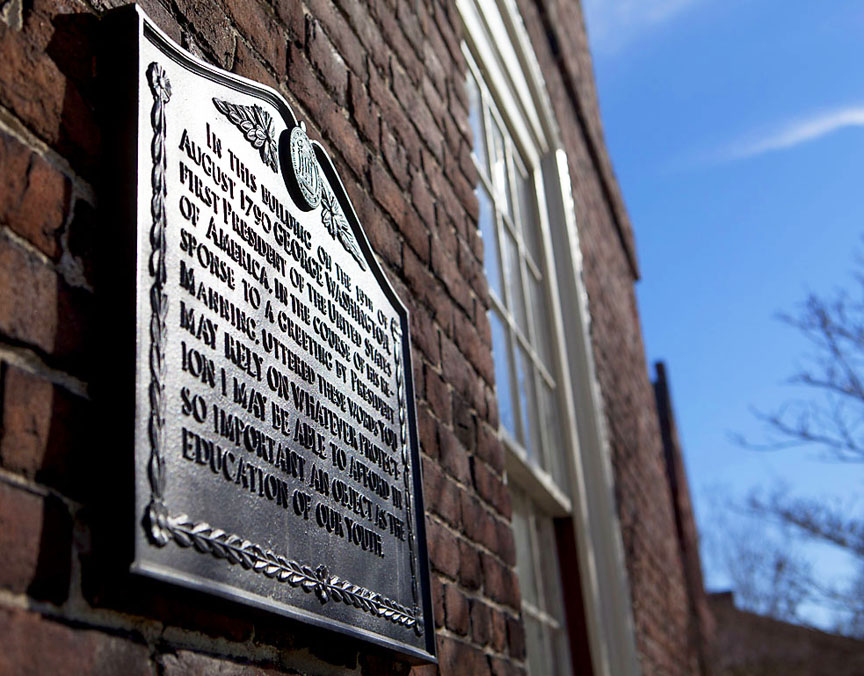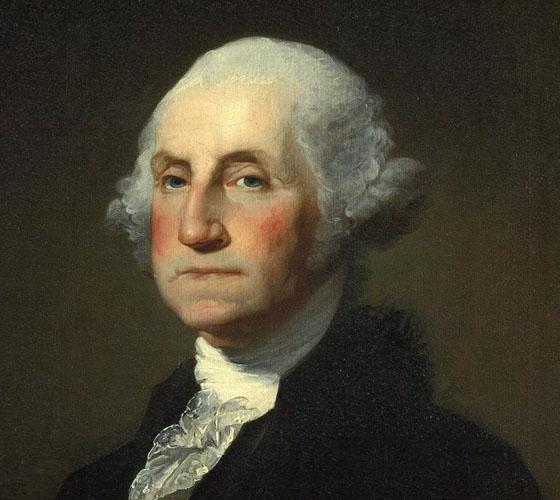On the President’s landing, he was welcomed by a federal discharge of Cannon, and the Ringing of Bells. The Concourse of People was prodigious. The Procession was conducted with great Decorum, and exceeded anything of the Kind before exhibited in this Town. [The Providence Gazette and Country Journal, August 21, 1790]
The joyful procession was that of President George Washington arriving in Providence at around 4 p.m. on a Wednesday afternoon after a seven-hour sail from Newport, thus beginning Brown’s history with the U.S. presidency.
According to a 1932 account by John Williams Haley, Washington stayed at Mr. Daggett’s Tavern on Benefit Street, and in the evening, “as he was about to depart for his night’s rest he was informed that the students on the Hill had prepared a special illumination of the building now known as University Hall, and that they would be highly honored if he would visit the College and view the spectacle. Although it was raining slightly, and contrary to his usual custom of remaining indoors at night, he climbed the hill in company with a few friends and there beheld the college building completely illuminated with candle lights in every window.”
The windows of University Hall have been illuminated at Commencement and on special occasions ever since.
The newspaper reported that the following day, August 19, 1790, Washington strolled on the College Green with President Manning. Inside University Hall, Manning delivered a greeting to Washington on behalf of the Corporation, in which he said, “Sir, though among the last to congratulate you on your Advancement to that dignified and important station to which the unanimous Voice of a grateful Country has called you, the Corporation of Rhode-Island College claim to be among the first in Warmth of Affection for your Person, and in Esteem for your public Character. ... For the preservation of this Freedom, one great object still demands our peculiar attention - the education of our youth.” (The reference to the delayed exchange of congratulations was due to the fact that Rhode Island was the last of the 13 former colonies to ratify the Constitution, having done so only on May 29, 1790.)

A plaque commemorating this exchange was presented to the University in 1932, on the bicentennial of Washington’s birth. It now hangs on the west side of University Hall.
According to Encyclopedia Brunoniana, at the Commencement exercises two weeks after his visit, the degree of Doctor of Laws was conferred upon Washington, who was the only U.S president to be serving in office when receiving this award. Brown has bestowed the honor on six other presidents: John Adams in 1787, Thomas Jefferson in 1797, Woodrow Wilson in 1903, Herbert Hoover in 1916, and Lyndon Johnson in 1960, all of whom received their degrees before election, and William Howard Taft, who received his in 1914 after leaving office.

